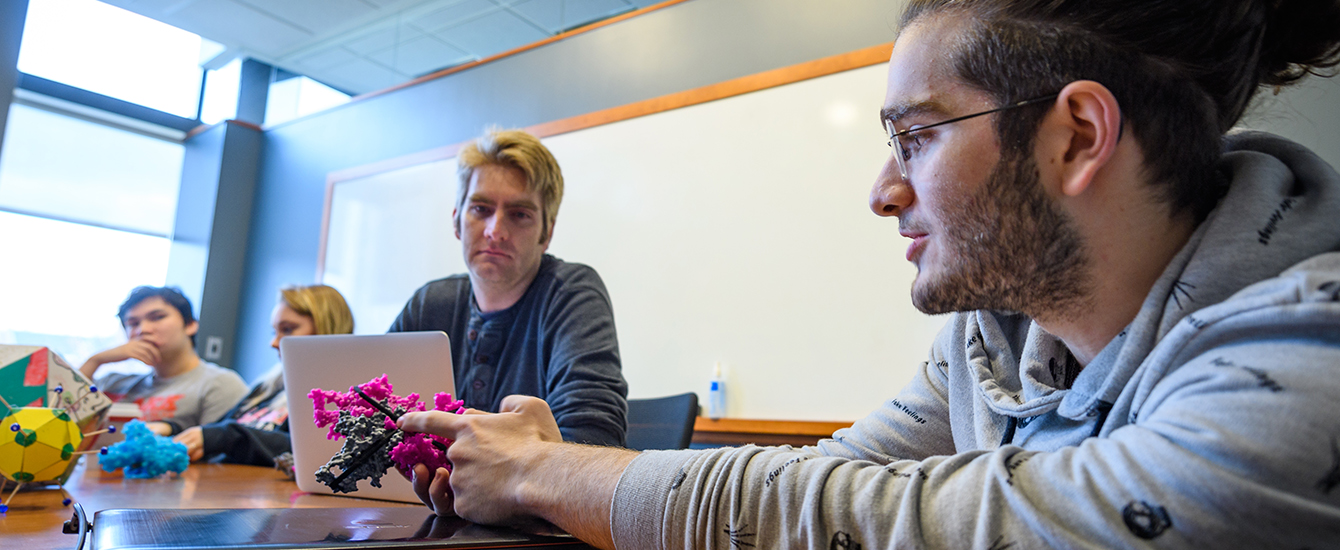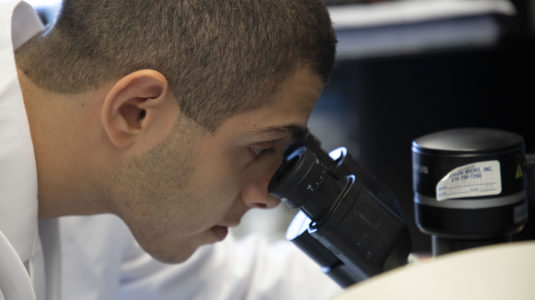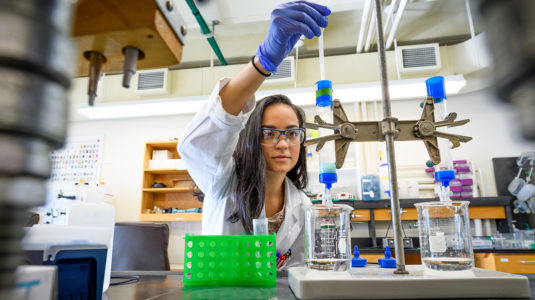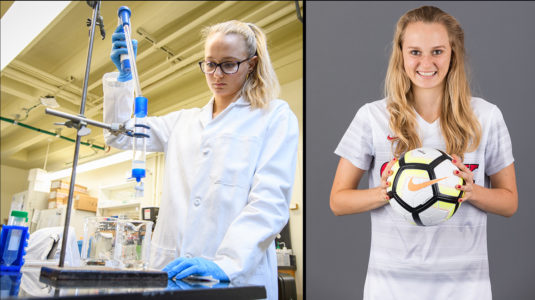Clark student explores genetic structures in tumors to help develop trea...
The opportunity to conduct research as part of a faculty laboratory can be a defining experience of your undergraduate education.
Participation in research shows you real-world applications of classroom knowledge and skills, and provides invaluable experience whether you want to pursue a career in industry or go on to medical, veterinary, or graduate school.
You can get involved in research in different ways. You might:
- Conduct research as part of a research course or internship, or participate informally in faculty research during your spare time.
- Apply to our summer research program. Typically, about a dozen students each receive a stipend of to live on campus for 10 weeks while working with a specific Clark faculty member.
- Apply for funding to support your own research on a project of your choice during the academic year or during the summer.
Through collaboration with faculty researchers, you can gain skills, experience, and even publish articles in scientific journals.
Undergraduate Research in Biology Undergraduate Research in Chemistry
Fall Fest and Academic Spree Day
At Fall Fest and, in the spring, Academic Spree Day, undergraduate students from throughout the university display and talk about their research and creative work.
- Structural and Biochemical Characterization of HACE1: A HECT E3 Ubiquitin Ligase Involved in Huntington’s Disease and Wilms’ Tumor. Diana Argiles Castillo, ’19 (sponsor: Professor Donald Spratt)
- Development of an Organic Chemistry Lab: Analysis of Fatty Acids Composition in Cooking Oils Through LC/MS. Luke Barrows, ’19 (sponsor: Professor Charles Jakobsche)
- Structural and Biochemical Analysis of the HECT E3 Ubiquitin Ligase, HECW2, and its Implications in Progeria. Justine Bohl, ’19 (sponsor: Professor Donald Spratt)
- Expression and Purification of KRasB. Dylan Gillespie, ’19 (sponsor: Professor
Arundhati Nag) - Structural and functional studies of the HECT E3 ubiquitin ligase E6AP reveal a possible mechanism for the neurodevelopmental disorder Angelman Syndrome. Chloe Kellum, ’19 (sponsor: Professor Donald Spratt)
- Biochemical and Biophysical Characterization of HECT E3 Ubiquitin Ligase AREL1 and its Implications in Apoptosis. Emily Ladda, ’19 (sponsor: Professor Donald Spratt)
- Analyzing Aggregation Properties Across A Family of Amyloid Fibril Binding Small Molecules Anh-Vy Le, ’20 (sponsor: Professor Charles Jakobsche)
- Kinetics of IDE-Dependent Degradation of Insulin in the Presence of Polyphenols. Bethany Lee, ’20, Lili Wurfl, ’19, Saadman Islam, ’19 (sponsor: Professor Noel Lazo)
- Biochemical and Structural Examination of HERC4 – a HECT E3 Ubiquitin Ligase that Controls Spermatogenesis, Cancer Metastasis, and Organ Size. Young Sun Lee, ’19 (sponsor: Professor Donald Spratt)
- Biophysical Analysis of Antp and Ubx Homeodomain Transcription Factor-DNA Binding Affinity. Jeanmarie W. Loss, ’19 (sponsors: Professor Donald Spratt, Professor Robert Drewell, Professor Jacqueline Dresch)
- Biophysical Studies of Ubiquitin E3 Ligase, HECTD1, and its Disease Relevance. Misa Mai, ’19 (sponsor: Professor Donald Spratt.
- A Tale of a Tail: Structural and Functional Studies of HERC2 C-Lobe with Implications in Breast Cancer. Kayla Rich, ’19 (sponsor: Professor Donald Spratt)
- Biophysical Analysis of AbdA and AbdB Homeodomain Transcription Factor-DNA Binding Affinity. Rylee Simons, ’19 (sponsors: Professor Donald Spratt, Professor Robert Drewell, Professor Jacqueline Dresch)
- Biochemistry and Mechanism of HECT E3 Ubiquitin Ligase HUWE1. Noor Alzuhairy ‘17 (Sponsor: Professor Donald Spratt) – LEEP Project
- Characterization of the HECT E3 Ubiquitin Ligase HECTD1. Vladislav Kiveliyk ‘17 (Sponsor: Professor Donald Spratt)
- Biochemical Characterization of HERC2, a HECT E3 Ligase Implicated in Breast Cancer and Prader-Willi Syndrome. Noah Schwaegerle ‘17 (Sponsor: Professor Donald Spratt)
- Helix-Dipole Effects on Amyloid Formation in the Presence of Model Membranes. Senegal Carty ‘17 (in collaboration with Qiuchen Zheng, graduate student; Sponsor: Professor Noel Lazo).
- Biochemical Characterization of TRIP12, a HECT E3 Ubiquitin Ligase Linked to Autism Spectrum Disorder. Alexandra Brown ‘17 (Sponsor: Professor Donald Spratt)
- Biochemistry and Mechanism of HACE1. Janel Gardner ‘17 (in collaboration with Yaya Wang & Steven Beasley, graduate students; Sponsor: Professor Donald Spratt)
- HECT E3 Ubiquitin Ligase WWP1: a major player in cellular signaling pathways and diseases. Emilie Ogisu ‘17 (Sponsor: Professor Donald Spratt)
- Fluorescently labeled non-viral DNA delivery Vector. Alva Tan ‘17 & Sharon Chieng ‘17 (Sponsor: Professor Sergio Granados-Focil)
- HECTD3 E3: A Ubiquitin Ligase Associated With Breast Cancer. Andres Torres ‘17 (Sponsor: Professor Donald Spratt)
- Structure-based identification of C-terminal Binding Protein inhibitors from the Zinc-database compound library. Antony Gruness ‘17 (in collaboration with UMass Medical School; Sponsor: Professor David Thurlow)
- Characterization of AREL1 to understand apoptosis resistance in cancer cells. Pinky Htun ‘17 (Sponsor: Professor Donald Spratt)
- Biochemical Characterization of HECT E3-Ubiquitin Ligase Itch and its Implications in Cancer. Roela Bardhi ‘17 (Sponsor: Professor Donald Spratt)
- Studies to Better Understand the Structure and Mechanism of Smurf1, a HECT E3 Ubiquitin Ligase. Lara Prosterman ‘17 (Sponsor: Professor Donald Spratt)
Fifth-year Research
If you excel in our undergraduate research program, you may qualify for Clark’s Accelerated B.A./M.S. Program in biochemistry and molecular biology. This program allows you to continue your undergraduate research during the fifth year and culminates in a written thesis and public presentation and defense.
- Anny Qurrat Ul-Ain ’18, MA ’19, BCMB 5th Year Program, “Development of Novel Copper-Peptide Complexes for Water Oxidation” – Expected to graduate in December
- Micheal T. Kebede ’18, MA ’19, BCMB 5th Year Program, “Determinants of the IDE-Dependent Degradation of Insulin”
- Noah Schwaegerle ’17, MA ’18, BCMB 5th Year Program, “Biochemical and Structural Characterization of the Large HECT E3 Ubiquitin Ligase HERC2”
- Senegal Carty ’17, MA ’18, BCMB 5th Year Program, “Connections Between Protein Misfolding and Monobenzone – Induced Vitiligo”
- Thanaphorn Suk-in ’16, MA ’17, BCMB 5th Year Program, “Functionalization of liner poly(ethylenimine) (PEI) as DNA-binding polymer for Gene therapy applications”
- Linshu Wang, MA ’16, BCMB Masters Student, “Towards Hydrazine-Functionalized Peptides as Potential Lysyl Oxidase Inhibitors and a 4-Step Amine to Alcohol Conversion via N-Nitrosoamides”
- Rhady Sorm ’14, MA ’15, BCMB 5th Year Program, “Biophysical Effects of Polyphenols on Model-Membrane-Mediated Aβ42 Self-Assembly”
Honors Program
The Biochemistry and Molecular Biology (BCMB) Program offers students who are conducting research the opportunity to present their research publicly in the form of a written thesis and public oral presentation. The work is evaluated by the BCMB faculty and students are recognized with the award of honors, high honors, or highest honors, a distinction that is included on the student’s official transcript.
Most students begin honors work in the second semester of their junior year, which continues into their senior year. Thesis submission and the public presentation occur in the spring of the student’s senior year.
Recent Senior Honors Theses
- Emily Ladda ’19, BCMB (adviser: Donald Spratt)
- Kayla Rich ’19, BCMB (adviser: Donald Spratt)
- Riley Simons ’19, BCMB (adviser: Donald Spratt)
- Diana Argiles Castillo ’18, BCMB, “Biochemical Characterization of the HECT E3 Ubiquitin Ligase HACE1 (HECT domain and Ankyrin repeat-Containing E3 ubiquitin protein ligase 1) and its Implications in Cancer and Huntington’s Disease” (adviser: Donald Spratt)
- Jordan Majka ’18, BCMB, “The Effects of Atrial Fibrillation on Relative Epicardial Fat Area and MicroRNA Expression: Investigating Robust Biomarkers and Their Implications in an Arrhythmia Disorder”
- Roela Bardhi ’17, BCMB (adviser: Donald Spratt)
- Devon Fontaine ’17, Chemistry, “Synthesis and Characterization of a Multifunctional Amyloid-Binding Molecule” (adviser: Charles Jakobsche)
- Pinky Htun ’17, BCMB (adviser: Donald Spratt)
- Vladislav Kiveliyk ’17, BCMB (adviser: Donald Spratt)
- Clare Krasinski ’17, BCMB (adviser: Noel Lazo)
- Alistair Richardson ’17, BCMB (adviser: Sergio Granados-Focil)
- Noah Schwaegerle ’17, BCMB (adviser: Donald Spratt)
- Ashley Burke ’16, BCMB, “Inhibition Studies of Lysyl Oxidase and Other Amine Oxidases with Hydrazine Containing Small Molecules and a Molecular Probe” (adviser: Charles Jakobsche)




